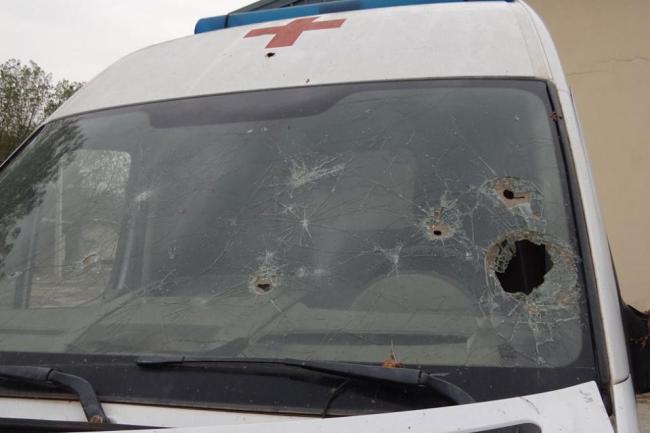
Attacks on health care and medical personnel in crises occur with ‘alarming frequency’ – UN
According to the report, Attacks on Health Care: Prevent, Protect, Provide, over the two-year period from January 2014 to December 2015, there were 594 reported attacks on health care that resulted in 959 deaths and 1,561 injuries in 19 countries with emergencies.
The most disturbing challenge for health care providers during emergencies is when they themselves are the victims of attacks – real or threatened, targeted or indiscriminate, the report emphasized.
“Yet, we witness with alarming frequency a lack of respect for the sanctity of health care, for the right to health care, and for international humanitarian law: patients are shot in their hospital beds, medical personnel are threatened, intimidated or attacked, hospitals are bombed,’ WHO said.
Such attacks not only endanger health care providers; they also deprive people of urgently needed care when they need it most. And while the consequences of such attacks are as yet largely undocumented, they are presumed to be significant – negatively affecting short-term health care delivery as well as the longer-term health and well-being of affected populations, health systems, the health workforce, and ultimately our global public health goals.
More than half of the attacks were against health-care facilities and another quarter of the attacks were against health-care workers. Sixty-two per cent of the attacks were reported to have intentionally targeted health care, the report found.
In a press release, WHO highlighted that it collaborates closely with others to better understand the problem, bring attention to the issue, and find solutions that can prevent attacks; protect health facilities, workers, transport and supplies; and ensure the continued provision of health care despite such attacks.
Noting that currently there is no publicly available source of consolidated information on attacks on health care in emergencies, the agency said the report is a first attempt to consolidate and analyze the data available from open sources. While the data are not comprehensive, the findings shed light on the severity and frequency of the problem, WHO said.
Even one attack on health care is one too many. Therefore, the number of reported attacks reflected in this report is tragic, said WHO, underscoring that the high tolls of death and injury to our health colleagues and the inevitable impact on health service delivery call for greater action.
The main conclusions to be drawn from the analysis of the available data are the following:
standardize information;
document health impact;
establish global repository;
advocate at all levels; and
document and apply good practice to reduce risk.
Photo: WHO/G. Novelo
Source: www.justearthnews.com
According to the report, Attacks on Health Care: Prevent, Protect, Provide, over the two-year period from January 2014 to December 2015, there were 594 reported attacks on health care that resulted in 959 deaths and 1,561 injuries in 19 countries with emergencies.
The most disturbing challenge for health care providers during emergencies is when they themselves are the victims of attacks – real or threatened, targeted or indiscriminate, the report emphasized.
“Yet, we witness with alarming frequency a lack of respect for the sanctity of health care, for the right to health care, and for international humanitarian law: patients are shot in their hospital beds, medical personnel are threatened, intimidated or attacked, hospitals are bombed,’ WHO said.
Such attacks not only endanger health care providers; they also deprive people of urgently needed care when they need it most. And while the consequences of such attacks are as yet largely undocumented, they are presumed to be significant – negatively affecting short-term health care delivery as well as the longer-term health and well-being of affected populations, health systems, the health workforce, and ultimately our global public health goals.
More than half of the attacks were against health-care facilities and another quarter of the attacks were against health-care workers. Sixty-two per cent of the attacks were reported to have intentionally targeted health care, the report found.
In a press release, WHO highlighted that it collaborates closely with others to better understand the problem, bring attention to the issue, and find solutions that can prevent attacks; protect health facilities, workers, transport and supplies; and ensure the continued provision of health care despite such attacks.
Noting that currently there is no publicly available source of consolidated information on attacks on health care in emergencies, the agency said the report is a first attempt to consolidate and analyze the data available from open sources. While the data are not comprehensive, the findings shed light on the severity and frequency of the problem, WHO said.
Even one attack on health care is one too many. Therefore, the number of reported attacks reflected in this report is tragic, said WHO, underscoring that the high tolls of death and injury to our health colleagues and the inevitable impact on health service delivery call for greater action.
The main conclusions to be drawn from the analysis of the available data are the following:
standardize information;
document health impact;
establish global repository;
advocate at all levels; and
document and apply good practice to reduce risk.
Photo: WHO/G. Novelo
Source: www.justearthnews.com
Support Our Journalism
We cannot do without you.. your contribution supports unbiased journalism
IBNS is not driven by any ism- not wokeism, not racism, not skewed secularism, not hyper right-wing or left liberal ideals, nor by any hardline religious beliefs or hyper nationalism. We want to serve you good old objective news, as they are. We do not judge or preach. We let people decide for themselves. We only try to present factual and well-sourced news.







